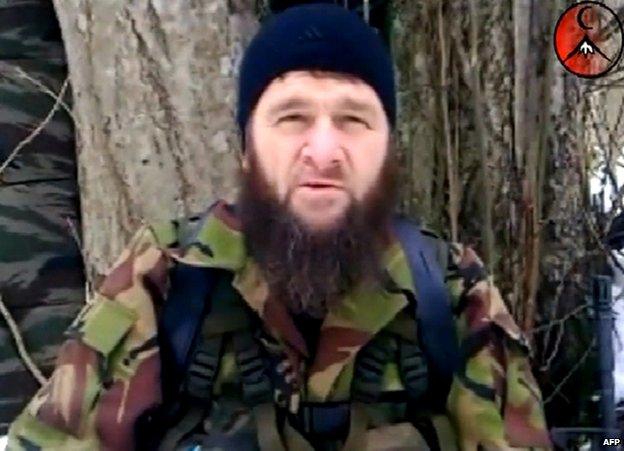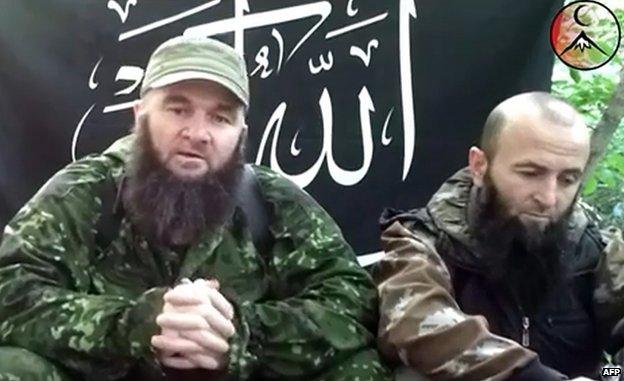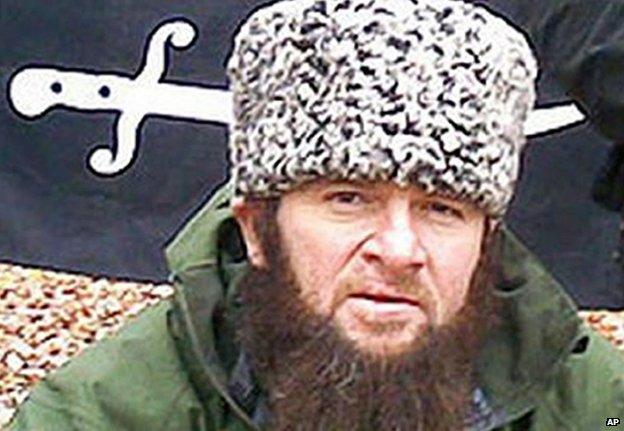Profile: Chechen rebel leader Doku Umarov
- Published

Separatist leader Doku Umarov fought in both wars against Russia
Doku Umarov is the Chechen separatist warlord most closely linked to a string of deadly attacks on Russia.
One of Russia's most wanted rebels, his death has been wrongly claimed on several occasions by Russian security services. The latest report, however, comes from a website considered sympathetic to Caucasus militants fighting Russian rule.
In July 2013, the self-styled emir of the Caucasus Emirate called on Islamists to target the Sochi Winter Olympics.
Although no attacks took place during the Games themselves, two bomb blasts in December 2013 close to the volatile Caucasus region where he operated killed more than 30 people in the southern Russian city of Volgograd.
He said he was behind the Moscow airport bombing on 24 January 2011, which left 36 people dead and 180 injured, and the March 2010 suicide bombings on the city's Metro, in which 39 people died.
Mr Umarov is also said to have ordered the November 2009 bombing of a train from Moscow to St Petersburg that claimed 26 lives.
Security minister
For years Mr Umarov has been seen as the leader of the Islamist insurgency in the North Caucasus.
He spearheaded several high-profile rebel raids, and fought in both wars against Russia since 1994.
He also served as Chechnya's security minister during its short-lived independence between 1996 and 1999.
He became the commander of the "south-western front" of the rebel armed forces in 2002, and is believed to have about 1,000 fighters under his command.
Mr Umarov is said to have played a key role in organising an attack in the neighbouring republic of Ingushetia in June 2004, in which several dozen people, including the acting Ingush interior minister, were killed.
He has also been accused by Russian security forces of leading the 2004 school siege in Beslan, which resulted in more than 300 deaths. The allegation has never been substantiated, although hostages have said he was the only attacker not to wear a mask.

In a 2013 video, Umarov (L) was seen appealing for Islamist attacks targeting the Sochi Winter Olympics
In Chechnya, he is suspected of being behind a string of kidnappings for ransom, and is said by officials to have been involved in killing Chechens who were co-operating with the pro-Kremlin government.
In a video statement in March 2010, Mr Umarov called the Moscow Metro bombings "a legitimate act of revenge for the continued assassinations of civilians in the Caucasus".
"I told you, the Russians, that now you only see the war on your TV screens, and you don't respond to the crimes of the FSB [security agency] bandits and to the crimes of [Prime Minister Vladimir] Putin himself."
After the Moscow airport bombings in 2011, he said he would no longer target civilians. But that changed with his 2013 video declaration targeting the Sochi Olympics, because he said the Russians were holding the Games on the "bones of our ancestors".
'Enemies of Muslims'
Mr Umarov rose up the Chechen rebel hierarchy after Russian forces killed his predecessor, Khalim Saydullayev, in 2006 and rebel leader Aslan Maskhadov in 2005.

Shamil Basayev, the mastermind of the Beslan siege, also died in 2006.
In his first public statement shortly afterwards, Mr Umarov vowed to step up attacks against Russian police and military targets.
Then, in October 2007, a proclamation was issued naming him the emir of the new "Caucasus Emirate" - a purported Islamic state spanning several republics in the Russian North Caucasus.
Mr Umarov described Western countries as the enemies of all Muslims, and announced his intention to install Sharia law across the region.
It was the first time a Chechen leader had echoed al-Qaeda's rhetoric, and he explicitly linked his movement to international Islamist groups.
Analysts said the move reflected the growing influence of non-Chechen members on the republic's militants, and the transformation of the movement's focus from separatism to fundamentalism.
Several members of the Chechen government-in-exile resisted the development. Akhmed Zakayev swiftly declared himself the exiled government's prime minister and called the radicalisation of the movement a "personal tragedy".
Several children

The most recent report of his death came in January 2014
Mr Umarov was born in 1964 in the southern Chechen village of Kharshenoi, and earned an engineering degree from the local university.
He is married with at least six children. Two of his brothers, Issa and Mussa, have been killed in combat.
The fate of his father, Hamad, captured several times by Russian forces, is unknown. His wife and child were also taken hostage, but were released in 2005 following media pressure.
Like most Chechen rebel commanders, Mr Umarov has been declared dead before.
Most recently, Russian-backed Chechen leader Ramzan Kadyrov said in January 2014 that security forces had intercepted a conversation by insurgents that indicated he had almost certainly been killed.
In March 2011, reports said he could have been killed in a raid by Russian special forces on a base in Ingushetia, in which 17 militants died, including a close aide.
But despite the claims, Doku Umarov has proved elusive.
In a statement that followed the Moscow Metro bombings, he purportedly said: "To anybody who calls me a terrorist, I will just laugh in their face, be they politicians or journalists."
- Published24 January 2011